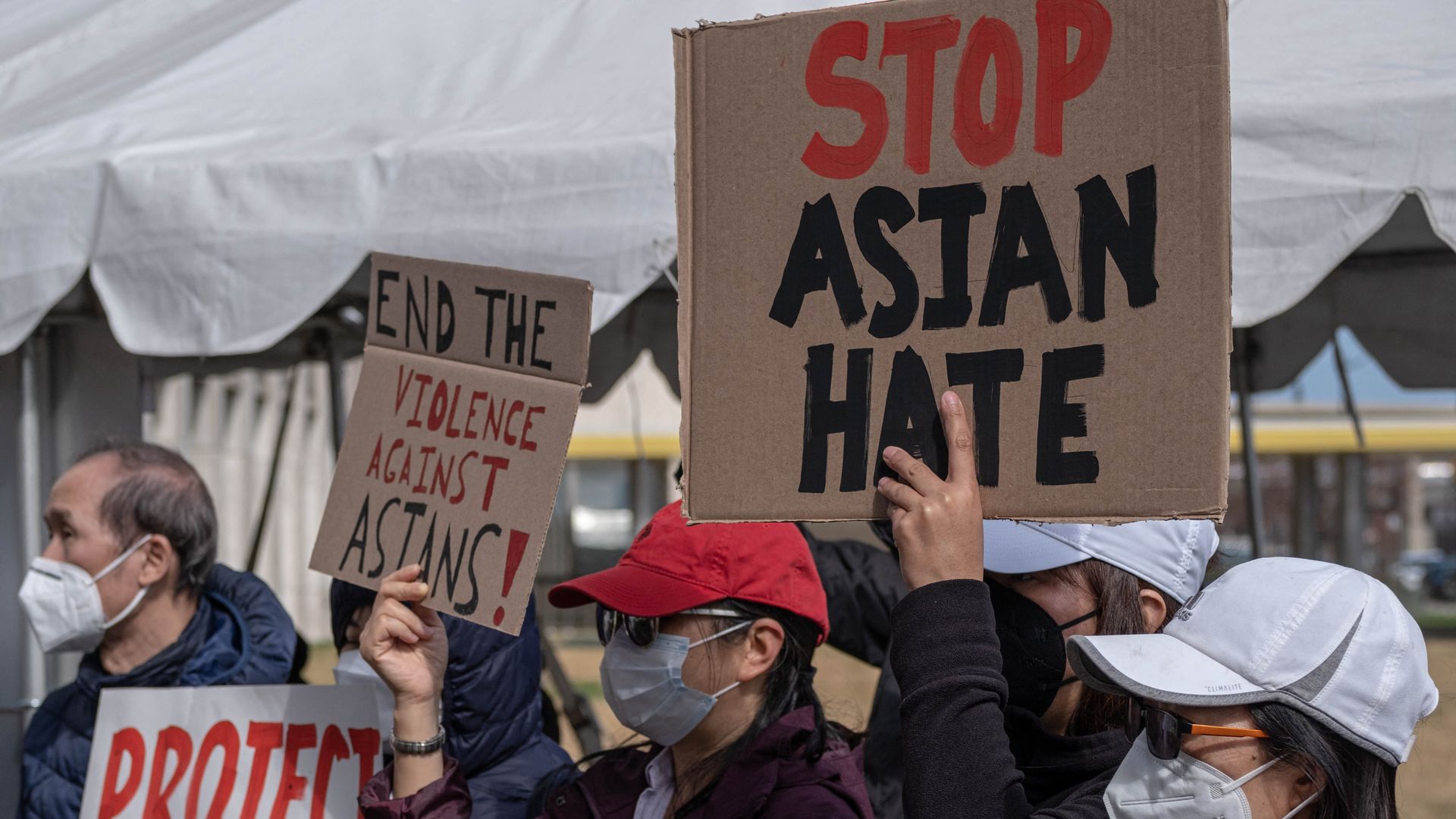Congress "will never forget the victims" of the Atlanta spa shootings
Add Axios as your preferred source to
see more of our stories on Google.

Photo: Seth Herald/AFP via Getty Images
A year after the Atlanta spa shootings that resulted in the deaths of eight people, including six Asian women, Rep. Judy Chu (D-Calif.), chair of the Congressional Asian Pacific American Caucus, vowed that Congress "will never forget about the victims."
Driving the news: The March 16, 2021, shootings led to a historic anti-Asian hate crimes legislation, known as the COVID-19 Hate Crimes Act, but the Asian community has continued to grieve high-profile violent attacks and murders throughout 2022.
By the numbers: There were at least 10,905 incidents against Asian American and Pacific Islander people between March 2020 and December 2021, according to Stop AAPI Hate's most recent national report on the matter.
- There were 4,632 incidents reported to Stop AAPI Hate in 2020, and the number increased to 6,273 in 2021.
- There are likely more incidents that are currently unreported.
- Experts don’t anticipate the number of incidents to decrease in 2022: "Unless we see real reforms enacted, such as investments in community-based reforms and civil rights enforcement, we cannot expect the number of hate incidents to go down," Manjusha Kulkarni, executive director of AAPI Equity Alliance and co-founder of Stop AAPI Hate, told Axios.
What they're saying: "It is important for us to acknowledge that these anti-Asian hate crimes are still occurring one year after the Atlanta shootings," Chu told Axios in an interview.
- "The Atlanta shootings were indeed a turning point. It was a time when the nation woke up to the severity of anti-Asian hate. We will never forget the victims of that shooting, and we need to continue our vigilance in stopping these incidents of hate."
- Chu met with the victims' families in March 2021, shortly after the attacks: "I will never forget meeting with the families of the victims who had lightning strike them when they found out about the murders of their loved ones. I will never forget the tears streaming down their faces when they could barely talk about it because it was something that they could never have imagined."
The shootings resulted in the deaths of Xiaojie "Emily" Tan, Daoyou Feng, Delaine Ashley Yaun, Paul Andre Michels, Yong Ae Yue, Soon Chung "Julie" Park, Hyun Jung Grant and Suncha Kim.
- The shooter, Robert Aaron Long, was sentenced to life without parole after pleading guilty to the murders of four of the victims and other charges related to the crime.
- He's now facing charges for the other four killings in Fulton County, where the district attorney is seeking the death penalty and sentencing enhancement under Georgia's new hate crimes law, per NPR.
The latest: President Biden this week signed into law a $1.5 trillion bill to fund the government through the end of September, which includes provisions that Chu said are the "follow up" of the COVID-19 Hate Crimes Act:
- $5 million to fund the Jabara-Heyer NO HATE Act, which "seeks to promote better hate crimes data collection as well as a more informed approach to hate crime prevention at the federal, state and local levels," according to the Human Rights Campaign.
- $5 million in grants to support community-based approaches to reduce hate crimes.
- $2.52 million for initiatives to promote the teaching of AAPI history.
Chu introduced a resolution, alongside Reps. Carolyn Bourdeaux (D-Ga.) and Lucy McBath (D-Ga.), on Tuesday to commemorate the one-year anniversary of the shootings and to denounce anti-Asian hate.
- The shooter "clearly had some intention of harming Asian women, and he did," Chu said.
- With this resolution, "we want to remind people that these were mothers, there were daughters ... and that these killings were just an inflection point for the [AAPI] community to how vulnerable, indeed, we were."
Go deeper: Atlanta spa killings stir even more fear among Asian Americans
Editor's note: This article has been updated with new details from Manjusha Kulkarni.
